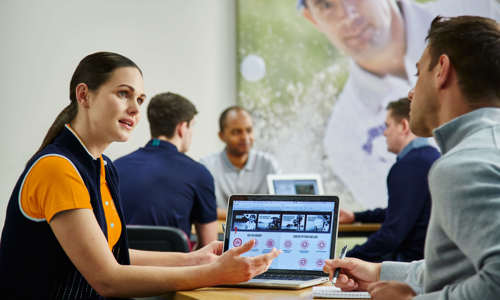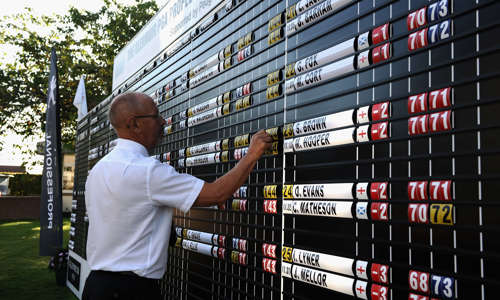Cambodia's calling

22/08/2021
Cambodia is fast developing into one of South-East Asia’s hottest new golf destinations, thanks to a growing number of championship layouts and upmarket resorts.
The PGA Professional magazine talks to three PGA Members who are using their experience to help their facilities gain a foothold in the domestic and international golfing market.

Alan Martin
General Manager, Grand Royal Golf & Resorts, Phnom Penh
What has been your career path to date?
I started my career in 2006 as a PGA Trainee at Dunbar Golf Club in Scotland. After four years there I moved to Old Course Hotel in St Andrews as Head Assistant. During my time in St Andrews, I always explored opportunities to travel and work overseas during the winter months. In 2015, I secured a six-week post in Kuala Lumpur, Malaysia, and it was during this time that golf in Cambodia appeared on my radar. The Head Professional’s job at Angkor Golf in Siem Reap was posted so I took the opportunity to fly from Malaysia to visit and I subsequently secured the role. I travelled back to the UK as planned and three months later relocated in Cambodia to start the job.
At the time it seemed like a huge risk, and many asked why I hadn’t chosen to stay in St Andrews and work my way up the ladder, but I felt that working in Cambodia would help me grow personally and professionally at a faster pace and give me different experiences that I would not otherwise get by staying in Scotland. I believed at the time an international role would make me a more diverse and rounded PGA Professional. As I look back, I am glad I decided to take the leap.
How did you find out about your current role?
In January 2019, Chip Mong Group, one of Cambodia’s top multi-sector developers, acquired Royal Phnom Penh Golf Club and later that year separately acquired Grand Phnom Penh Golf Club. The opportunity to relocate to Phnom Penh was hugely attractive as again I saw it not only as an exciting challenge, but the chance to take a significant step forward in my career.
What is the remit of your job and what does a typical working day involve?
As general manager, I’m in charge of full operational management and strategic business development of two golf clubs – Grand Phnom Penh and Royal Phnom Penh – and I report directly to the board of Chip Mong Group. My key responsibilities include the re-structuring and integration of two operational businesses into the Chip Mong Group; managing a staff of 450 between the two properties, and planning and preparing a new masterplan for Grand Royal Golf & Resorts, with a focus on maximising financial performance and the supporting residential/commercial developments under Chip Mong Land.
As for my working week, like most clubs, weekends are the busier days, but outside of that business patterns are very ad hoc. Time management is important as I visit Royal Phnom Penh at least twice a week, the corporate office and/or Chip Mong Land HQ at least once a week, while most of my time is spent at Grand Phnom Penh, which is the head office for Grand Royal Golf & Resorts. I am part of the Chip Mong Land Executive Committee in an advisory role, and I join any leadership or strategic development groups. Of course, I also ensure I find some time to get out on the golf course for a regular game!
What are the most challenging parts of the job?
Managing change. The ownership is highly ambitious and striving to be the best. Taking over two existing businesses and staff who have been with the old company for 5-10 years and pushing them to change to meet new standards and expectations, while still running daily operations, is a huge challenge.
And the most rewarding?
Everything is positive and progressive, and although that comes with its own kind of pressure to see progress in daily operations, it is also highly rewarding. In addition, to be working on long-term master planning is also very exciting for the future of the two clubs. Cambodia has huge potential to become one of the most popular golf tourist destinations in South-East Asia, and it’s great to play a small part in that.
How has the pandemic affected your operations?
Starting a new job as the pandemic was arising in Asia was a little stressful, taking over two operational clubs and merging into a new company during COVID seemed like the perfect storm, but it forces you to get your head down and get things done. The workload is heavy at times, but we are fortunate to have only been closed for two weeks in late April 2021. In fact, the courses have been busy with local play. Last year at Royal we serviced 23,000 rounds and at Grand it was 38,000 rounds. This year’s number are very similar, with perhaps only a slight reduction. The extra work is to be expected with extra health and safety measure to ensure a safe environment for our staff and customers. At present we are moving closer to bi-weekly testing for all frontline staff and naturally there are extra logistics involved and planning for such an operation.
How easy has it been to settle into the local community?
The people of Cambodia are very humble and welcoming, making settling here since my move in 2015 pretty easy. My family and I are settled nicely in a diverse and safe compound attached to a British school where my son is currently enrolled. Phnom Penh is a lively city with a great F&B scene and western amenities are everywhere. At present there are some COVID restrictions in place, but generally, it is an easy place to live and have a good work/life balance. Travelling around South-East Asia pre-COVID was also very easy and I spent a lot of my time traveling to neighbouring countries.
What advice would you pass on to other PGA Members who may be interested in working in Cambodia?
Do it. Like relocating anywhere, you need to understand the history of the country and the culture of its people. Cambodia is certainly a very unique place in that there is poverty and there is extreme wealth. While there seems to be a growing middle class, the disparity between the two are glaring. If you are ambitious and looking to challenge yourself in a rapidly growing market, Cambodia is a good option. It was awarded Undiscovered Golf Destination of the Year at the 2019 at Asia Golf Tourism Convention, and I foresee significant growth here for golf over the next ten years.


Karl Whitehead
General Manager, Vattanac Golf Resort, Phnom Penh
How did you find out about your current role?
Vattanac Golf Resort was a newly acquired management contract for Troon. The Els Club Dubai, where I was working before, is Troon’s flagship venue in Dubai, and as such, I was lucky enough to host Vattanac’s owner on his regional visit to the UAE. Over the course of the tour and lunch, Mr Vattanac described the property, the plan, golf in Cambodia and his vision – and I was immediately interested and I subsequently joined in June last year.
The scale of the project, the vision of the owner, the excitement that Troon has for the region and the somewhat blank canvas for golf in Cambodia were all majorly inspiring. On top of that, I was excited to move to a new region, and to experience new experiences and challenges.
What is the remit of your role?
It is a very expansive role, working across almost all departments, but to summarise it comprises: ownership relations; lead the Troon management agreement; short- and long-term business strategy; leadership of over 450 employees; management of the country’s VVIP when on property; project development consultation; daily fee business; international business; events; retail; F&B; instruction; agronomy; finance; HR; procurement; sales; marketing; I.T; security; engineering. It would be too difficult to describe a typical day – every day is vastly different. But that is also the beauty of this industry – especially when working overseas.
What are the immediate plans for the facility?
Following the opening of our second Nick Faldo-designed Course, the West, last November, the next major milestone is our golf academy and our new clubhouse, both of which are currently under construction. The academy is 40,000 square foot facility that will host to two instruction rooms, four VIP rooms, three simulator rooms, a large retail outlet, a gym and wide choice of F&B options, while the clubhouse is a 500,000 square foot building. Remaining operational with these two projects going is something of a challenge.
How have operations been impacted by the pandemic?
The pandemic all but eradicated two high revenue generating business segments: tourism and large-scale corporate events. Without these, numerous strategies are required to bridge what can be high level displacement. However, like most parts of the world, local play has shown huge growth, and many Cambodians have taken up the game for the first time. The challenge operationally is the unpredictability – one day you’re operating in an all but normal fashion – and the next, it’s back to ‘code red’. With so much unknown and unpredictability, subjects such as budget, forecasting and planning are certainly far more challenging than normal. With so many of our purchases being overseas, we’ve also experienced some interesting challenges with procurement and shipping.
How do you see the future of golf developing in Cambodia?
Participation is on the rise and the future looks bright. Average spends are high, corporates remain strong and there is a clear passion for the game. The golf clubs out here are open and inclusive, and the culture on course is very much driven towards relaxation and fun. For instance, it’s not uncommon to find groups out on the course playing as a five- or a six-ball. Each golfer will have a personal caddie and often ride in a single person cart, while ‘ready golf’ is the default way of playing. It’s hugely refreshing, with an emphasis on having a socially relaxed game, with plenty of time given over to the hospitality side of things. Furthermore, the principle of golf being a great place to do business remains strong. Much work is required to grow the game from a grassroots level and once we have our academy, we hope to begin exploring that space in greater detail.
What advice would you pass on to other PGA Members who may be interested in working in Cambodia?
It’s a small network and the GMs are always looking for talent – therefore do not be shy in reaching out and taking the lead. It is not easy to jump into a senior position when making a move international, therefore, be willing start a lower level and work up. One of the best and most exciting things about the international division is how fast you can progress. If you work hard, are reliable and deliver results – the opportunity is endless. That short term ‘investment’ can most certainly pay off. To work international, you need a very open mind and have to be ready to adapt – at every single venue and country. Culture doesn’t change for you; you must adapt and find an effective way to operate in whatever culture you find yourself. It can be a challenge, but again, it’s one of the most enjoyable things.


David Baron
General Manager, Angkor Golf Resort, Siem Reap
How did you find out about your current role?
The general manager’s job at Angkor Golf Resort was listed with the executive search firm Colt Mackenzie McNair and a member of one of my former clubs encourage me to apply, so I did! I was lucky enough to be offered the job and I’ve now been in the role for nine years.
What is the remit of your role?
I oversee the management of the club, particularly from a commercial standpoint. The majority of my time is spent on sales and marketing, together with maintaining the operational standards and services. I spend a lot of my time on the ground, talking to staff, members and guests. Our business is a combination of local and tourist/visitor play, so it is important the club and brand is always represented in a professional manner and visible to international markets.
What are the most challenging parts of the job?
The club and team are very established now and we have a strong culture which helps with stability and consistency. As an expatriate worker there are always cultural challenges to overcome and adapt to and, of course, It’s a compromise to be away from family and friends for such long periods.
And the most rewarding?
The people. I’m fortunate to have amazing colleagues to work with each day. All of our successes are a team effort.
How has the pandemic affected operations?
It’s been extremely challenging. In February last year we were forced to close the course for four months. We re-opened in July 2020 and have remained open since then. We have managed to grow our domestic business, but Siem Reap relies heavily on tourism, so we missed our overseas guest. It’s been a phase of contingency planning and introducing new health & safety protocols into our operations. We also have 300 employees to consider when navigating these new challenges. Operations have cbeen scaled back, but we remain optimistic as boarders are beginning to open.
How easy has it been to settle into the country/local community and what’s day-to-day life outside of work like?
Cambodia is a wonderful place to live and work, and it was very easy to settle here. The local people are very welcoming and you can get everything you need here and more. Siem Reap is a beautiful town and a UNESCO World Heritage Site. Cambodia is still a developing country, but this also brings opportunity. Some considerations for families moving here would be schooling, healthcare and infrastructure.
What advice would you pass on to other PGA Members who may be interested in working in Cambodia?
I would say go for it! The golf industry is still in its infancy, but it is certainly developing. As with any new position, I would advise potential candidates to do as much due diligence as possible on the role, location and employer. If possible, I would recommend spending time here first before committing to a long-term move.
- Categories:
- International






































